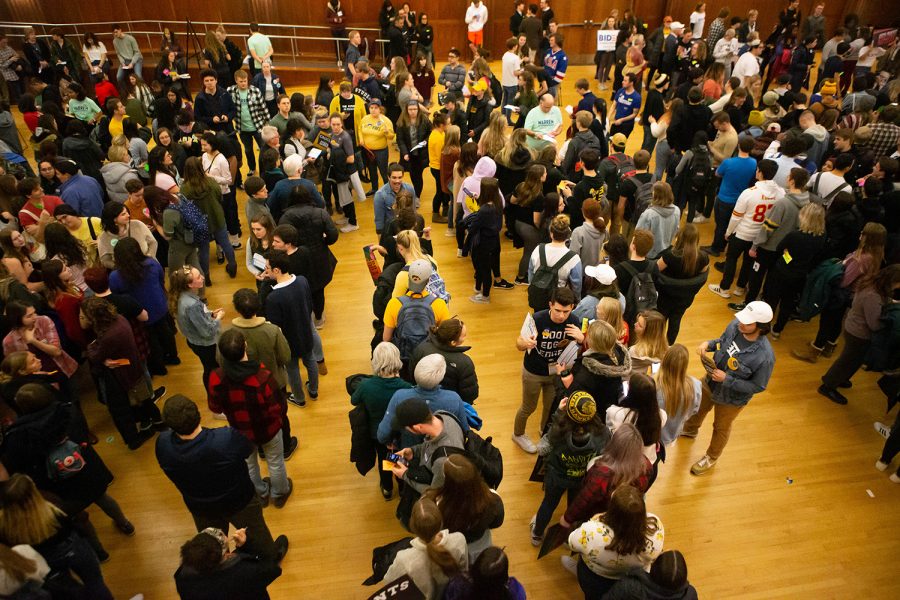Caucus changes prove to add issues in reporting preferred candidate, turnout
While Iowans still turned out to caucus in 2020, many issues were faced regarding new regulations, causing a delay in reporting turnout and results.
University of Iowa students form lines during the caucus at the Iowa Memorial Union on Monday February 3, 2020.
February 4, 2020
Iowans turned out to caucus across the state Monday night, some confused about new rule changes, while the Iowa Democratic Party faced delays in reporting results.
In an email to the press, Iowa Democrats Press Communications Director Mandy McClure stated that three sets of results had discrepancies in their reporting. McClure said the Iowa Democratic Party will check photos of results and paper trails in order to check the tech systems that are being used to tabulate the results.
At the Republican caucuses statewide, 32,001 caucusgoers were present and in Johnson County, Iowa’s bluest county, 827 Republican caucusgoers turned out. As of press time, Democratic turnout results were not available.
While the energy and anticipation remains high in Johnson County, many at the precinct locations remained hopeful.
“It’s my favorite political night, other than election night,” Betsy Miller, a former Vice President Joe Biden precinct captain said. “And we’re so lucky to be from Iowa… It’s grassroots and what America is all about.”
For the 2020 election, the Iowa Democratic Party promised changes to the first-in-the-nation caucuses with an early check-in option to expedite the entrance process, a streamlined realignment process, and satellite caucus locations. The Iowa Democratic Party will now record raw numbers, first alignment, and final alignment, while viable groups will be locked in during the first alignment period, even if the group is undecided.
According to Democratic Caucus Organizer John Deeth, the Iowa City 5 precinct located in the University of Iowa IMU experienced issues surrounding the new app for precincts. Frustrations arose with new rules and regulations as well, causing many nonviable groups to leave before the final alignment because of a lack of understanding the new rules — a problem he believes many faced across the state.
For incumbent GOP candidate President Trump, caucusgoers turned out at rates lower than in 2016, when a record of 180,000 Republican caucusgoers turned out.
At North Liberty Precinct 1 and 5 at the North Liberty Recreation Center, it was a unanimous vote by all 19 people present for Trump.
In North Liberty’s Republican caucus location, 10 people chatted in the community recreation center basement. Many made comments about the “circus” upstairs, referring to the Democratic caucus.
Charles Tomes, a caucus chair for both of the North Liberty precincts, began working for the Johnson County Republican Party in 2016.
“I prefer the caucus system compared to that of other states,” Tomes said about primary states. “This is where the process begins. The energy grows when we reach the county convention and beyond.”
Democrats turned out at low rates in Iowa in 2016, but the results are still underway for what officials say could be a record turnout.
Caucusgoers of all ages gathered in the Iowa City High School cafeteria, and Vicki Bachman, a 68-year-old entrepreneur Andrew Yang supporter, said she was prepared to caucus for a candidate who is forward-thinking and considerate of future generations.
Bachman said it was difficult to find parking outside City High, but once inside the organizers did a brilliant job directing caucusgoers to each precinct. As a former teacher in the Iowa City Community School District, Bachman said she was not expecting such a large crowd at a school she was very familiar with.
“I’ve been to City High many, many times, but I was shocked by how jam-packed it was all around,” she said.
In an effort to get more Iowans to the caucuses, Iowa City Transit added four new bus routes to serve caucus locations.
Anne Matte, communications and voting outreach coordinator of Disability Rights Iowa, said accessibility to the caucuses proved to be extremely difficult, which was a concern of the Democratic National Committee and why the Iowa Democratic Party implemented satellite caucus locations.
Just two weeks prior to the caucuses, Matte said, Iowa Democrats and Iowa Republicans began to process the nearly 300 accommodations requests. Had the parties allotted more time in advance, Matte said she believes there would have been many more requests.
“Promised improvement with language of accessibility was not properly delivered and it was thrown together to appease the community,” Matte said. “It was like dangling the carrot on the stick and trying to lead the community on. ADA is the law of the land — accessibility is not a new requirement.”
Annie Fitzpatrick and Hannah Rovner contributed to this report.






